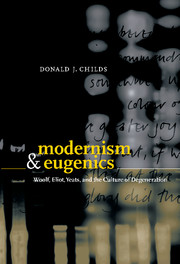Book contents
- Frontmatter
- Contents
- Introduction
- Chapter 1 Virginia Woolf's hereditary taint
- Chapter 2 Boers, whores, and Mongols in Mrs. Dalloway
- Chapter 3 Body and biology in A Room of One's Own
- Chapter 4 Eliot on biology and birthrates
- Chapter 5 To breed or not to breed: the Eliots' question
- Chapter 6 Fatal fertility in The Waste Land
- Chapter 7 The late eugenics of W.B. Yeats
- Chapter 8 Yeats and stirpiculture
- Chapter 9 Yeats and The Sexual Question
- Notes
- Index
Chapter 2 - Boers, whores, and Mongols in Mrs. Dalloway
Published online by Cambridge University Press: 22 September 2009
- Frontmatter
- Contents
- Introduction
- Chapter 1 Virginia Woolf's hereditary taint
- Chapter 2 Boers, whores, and Mongols in Mrs. Dalloway
- Chapter 3 Body and biology in A Room of One's Own
- Chapter 4 Eliot on biology and birthrates
- Chapter 5 To breed or not to breed: the Eliots' question
- Chapter 6 Fatal fertility in The Waste Land
- Chapter 7 The late eugenics of W.B. Yeats
- Chapter 8 Yeats and stirpiculture
- Chapter 9 Yeats and The Sexual Question
- Notes
- Index
Summary
And so Virginia Woolf came to consciousness in a world in which eugenics was seen to deserve very serious comment – from both the right and the left of the political spectrum, and from every variously interested point of view in between. Furthermore, the discourse of eugenics was borne in upon her both publicly and privately – on the one hand, as a matter of national urgency, and on the other hand, as a matter of great personal consequence with regard to decisions about marriage and having children. Not surprisingly, then, insofar as Mrs. Dalloway bears the traces of Woolf's engagement with her time and place, so it bears the traces of her engagement with eugenics. As we have seen, Bradshaw is a eugenist and the Christian Kilman is based in part upon the Christian eugenist Jean Thomas. Woolf's narrator (seeming to speak as Woolf herself on many occasions) certainly criticizes these figures devoted to goddesses like Proportion and Conversion, but it is by no means clear that she criticizes eugenics itself.
The eugenical subtext in Mrs. Dalloway appears in a number of ways. Lady Bruton, for instance, is a eugenist. Hugh Whitbread and Richard Dalloway are invited to lunch to help her with her “project for emigrating young people of both sexes born of respectable parents and setting them up with a fair prospect of doing well in Canada” (p. 164).
- Type
- Chapter
- Information
- Modernism and EugenicsWoolf, Eliot, Yeats, and the Culture of Degeneration, pp. 38 - 57Publisher: Cambridge University PressPrint publication year: 2001



